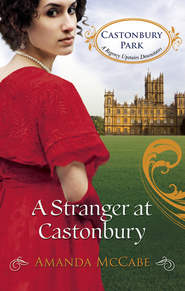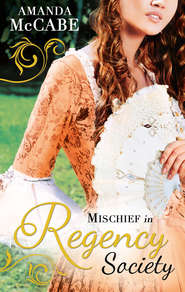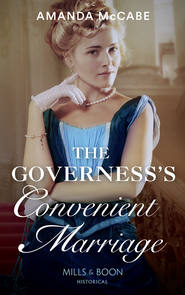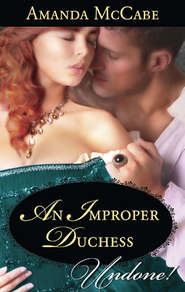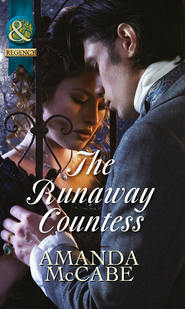По всем вопросам обращайтесь на: info@litportal.ru
(©) 2003-2025.
✖
A Regency Duchess's Awakening: The Shy Duchess / To Kiss a Count
Настройки чтения
Размер шрифта
Высота строк
Поля
Nicholas carefully put the portrait back into its case and hid it once more in the dark drawer. That past was gone, and he had to remember that.
But that did not mean he was quite ready to face answering all those invitations just yet. He left them on his desk and went to the window to stare down at the windswept street, at all the passers-by hurrying on their busy way. Nicholas always wondered where they were going, what purpose drove them onwards during their day.
Sometimes they stopped to peer past his wrought-iron gates, no doubt wondering the same thing about him. What did a duke do behind his grand walls? Manning House was one of the largest houses in London, a vast, impractical edifice of pale stone and copious windows his grandfather had built and which they were now stuck with for ever. It was grand and impressive, surrounded by gardens, crowned by a large ballroom and a dining room large enough for a state dinner. But it was impossible to heat, and right now it was good only for nieces and nephews to chase each other down the wide corridors, once they were old enough.
It needed a mistress, a hostess to redecorate the fusty old chambers and arrange for parties to suit its grandeur. Yet another reason to put the past away and think of that blasted, ever-present Duty.
Nicholas reached for the edge of the velvet drapery to draw it across the window. Maybe if he couldn’t see outside he couldn’t be distracted by what was happening on the street. As he tugged it closer, he glimpsed an open carriage rolling slowly past on the street, carrying two stylishly dressed ladies whispering together. One of them turned her head slightly, and a ray of pale sunshine caught on a blonde curl, a soft white cheek. It was Lady Emily Carroll.
She laughed at whatever her friend was saying, her pale cheeks flushed pink. She swept back that errant curl with her gloved hand.
How beautiful she is, Nicholas thought with bemusement. Oh, he had always known Lady Emily was beautiful; she was famous for it, and it was easy to see in the perfect symmetry of her heart-shaped face. He was struck by it last summer at Welbourne, but then forgot when she seemed not to like him.
Now, with her face alight with laughter, the sun on her hair, he saw it all over again. What could make her laugh like that? What could he possibly say to make her smile?
It was a challenge indeed. And a Manning was never one to back away from a challenge.
The carriage turned the corner, seeming to head toward the park. It was nearly the fashionable hour, when all the ton piled on to their horses and into their carriages and paraded past each other yet again.
Nicholas turned away from the window, and from the work that waited at his desk, and strode out of the library. All that could wait. “I need my horse saddled! “ he called. “Quickly!”
Chapter Four (#ulink_c541e54c-cbc6-57b6-82e3-3a2331d8c9af)
“Look, Emily! It’s Manning House. Isn’t it lovely?” Jane cried, gesturing at the vast mansion as their carriage bounced past. “Like a palace in a fairy story.”
Emily laughed as she studied the gleaming windows, laid out like endless rows of diamonds in white stone expressly to show off wealth great enough to counter any window tax. She remembered a line she learned once in lessons on Tudor history—’Hardwick Hall, more glass than wall.’ Somehow, it was hard to imagine the duke living there in that chilly mausoleum.
“If the fairy story is about the Snow Queen, bringing down winter from her mountain fortress,” she said. “It looks mightily uncomfortable.”
“But excellent for grand balls,” Jane declared, her gaze still fastened on the house. “Can’t you just imagine being the hostess of such a gathering? Being a duchess?”
“I can imagine it,” Emily said, still laughing. “It sounds horrid. Everyone staring all the time, everyone pestering for invitations to those grand balls …”
“Exactly! The Duchess of Manning would utterly rule society. She could set every fashion. Wouldn’t that be wonderful?” Jane sighed deeply, glancing back over her shoulder as they turned a corner and Manning House disappeared from view.
Emily’s laughter faded, a sneaking suspicion setting in as she studied her friend’s narrowed eyes. “Jane, have you set your cap at the Duke of Manning?”
“Oh, la, no!” Jane cried. The brief glint of calculation faded as she giggled. She straightened her feathered bonnet on her auburn curls and sat back against the carriage cushions. “I’m not such a fool as that. I’m too harum-scarum to ever be duchess material. That’s your department, Em.”
“Mine?” Emily said, shocked. “Of course not. I would make a wretched duchess.”
“Nonsense. You seem born to royalty, with your looks and your quiet grace. And since there is no eligible prince at present, a duke would be the next best thing. Especially one as handsome as Manning.” Jane leaned closer and whispered, “Don’t his blue eyes just make you want to melt?”
Well—they did, actually. Whenever he looked at Emily she longed to sink down through the floor, robbed of any powers of speech she might once have possessed. But she would never admit that, not even to Jane. Not even to herself.
“He is quite fine-looking,” she said carefully.
“Fine-looking?” Jane scoffed. “He is a veritable Greek god. My parents would be in alt if I could catch him, of course, but it would never happen. I shall have to settle for some country baronet, I suppose, like William Jameson. He seems on the verge of making an offer. What about you?”
Emily laughed. “I’m not in the least bit interested in Sir William!”
“Certainly not, who would be? That nose! But there must be someone you like?” “No, there’s no one.” “I cannot believe that.”
“Believe it, my dear Jane. I have met no one this Season I could be really fond of. Perhaps I shall have to find a country squire, too. Maybe a nice curate?”
She spoke in jest, but really a curate would be just right. An earnest, sincere young man who would read to her by the fire in the evenings. Who would ask for her help with his sermons, and praise her charity work in the neighbourhood and never grab her suddenly as Mr Lofton had. It would be perfect—if he had a roguish smile like the duke …
Emily gave her head a hard shake. “That is what I need.”
“A curate? Your parents would never allow it. You are the beautiful daughter of an earl!”
The shy daughter of an impoverished earl. “We’ll see what happens.”
The carriage turned through the gates of Hyde Park, joining the flow of vehicles and horses parading for the fashionable hour. “Don’t worry, Em, the Season is not done yet. We have time to find someone better than the Sir Williams of the world,” Jane said. She reached into her reticule and drew out a small square of vellum. “Maybe here?”
“What is that, Jane? Some sort of love letter?”
Jane giggled. “No, silly! Tickets to a masked ball at Vauxhall. My sister, Mrs Barnes, procured them for me, and she has agreed to chaperon us there. She’s terribly easy to distract, though—she won’t get in the way of our fun.”
“Vauxhall?” Despite herself, Emily was terribly intrigued. She had heard of the infamous masked balls held in the pleasure gardens, of romantic assignations in dark walkways and glorious illuminations that transformed the night. She had laughed at some of the wilder tales, sure they could not be true.
But—what if they were true? What if she went and saw them for herself?
She glanced down at the tickets. A concert by Signora Rastrelli, they read in scrolling script. Fireworks and illuminations grander than anything yet seen in London!
Music, fireworks. It did sound wondrous. But … “Jane, I’m not sure we should.”
“We’ll be wearing masks ! No one will even know we’re there.”
“My parents would never allow it.”
“Then just tell them you’re staying with me at my sister’s house that night. Tell them—oh, I don’t know! That her relation, a curate, has come to visit and has promised to read us some fine sermons.”
Emily laughed, torn between her duty and the promise of a little fun. Surely an evening of music could not be harmful? She didn’t plan to go off along the Dark Walk, after all.
Something deep inside of her, some tiny, terrible imp of mischief that seldom dared show itself, pushed at her. Go on, it whispered, soft and alluring. Be a little daring. What harm could it do? You have been working so hard.
But it could do a great deal of harm, she feared. Yet still the temptation was there.
“I don’t know,” she said. “I think—”
“Good afternoon, ladies!” someone called, interrupting her words. “Very pleasant weather we’re having, are we not?”
Emily looked up to see Mr George Rayburn approaching on his horse. He had been the only suitor to really appear this Season, dancing with her at her first ball and being attentive since then. He sent flowers, fetched her lemonade at parties, things of that nature—if that could really be called a suitor. He had not made an offer, and her parents would have refused him anyway. His fortune was respectable enough, from all reports, but he had no title.
Now, though, at the end of the Season, if he were to come forward, they might be more amenable. If Emily liked him, she could probably persuade them Mr Ray-burn was a reasonable match.
He drew in his horse next to their carriage and tipped his hat, smiling down at them. She should like him, Emily thought as she smiled back at him. He was terribly handsome, with waving, glossy dark hair and hazel eyes, a strong jaw and straight nose. He was tall and lean, athletic, much admired. He read poetry, had travelled widely, had correct opinions and impeccable manners.







